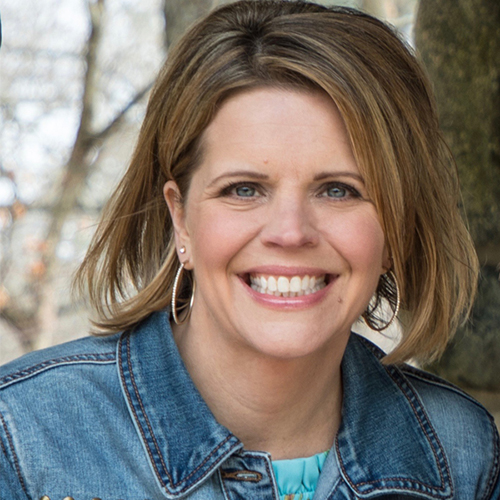"Good morning, Mrs. Carroll. This is Principal X from X Middle School.
I wanted to let you know that we had Boy X in the office this morning. We heard that he's been teasing some kids about their shoes and their food at lunch. He was very respectful and says he understands if it happens again there will be consequences."
Today was the fourth day of school. Day FOUR! How can this be happening?
"Thank you for letting me know," I say. "You can be assured that we will address this at home ... And tomorrow he will arrive wearing his dad's circa 1983 shoes from Kinney."
My mind instantly went to a dozen different directions. Was he teasing someone less fortunate? I felt ill.
"I'm heading to Wal-Mart where I'll find the cheapest, most grotesque shoes and he will wear them all year!" I announced to my husband.
"Tonight, I'm making Shit on a Shingle and he will have leftovers in his lunch tomorrow!" (That's chipped beef on toast, to those of you not from my generation.)
As the morning went on I grew even more upset, so I confided in my boss and a friend.
"Teachable moments!" said my boss.
My friend added that there are always two sides to every story, and that I should be sure to get his. I calmed down and decided I would take the casual approach when chatting with my son after school. After a few minutes in the car, he brought it up.
"Did you get a call from school?" he asked. I told him I did. And we talked.
He insisted he didn't know what they were referring to. "I asked Girl X if her chips were Italian ... Maybe that was it?"
Determined to get a better understanding, I e-mailed the principal with some more specific questions. How was I to address this or deliver consequences to a child who was unclear about what he had done? Within a few minutes, I received a call. The principal explained that a parent had called the school.
I gulped.
"In addition to the comments about his son's shoes, Boy X had made comments about someone else's ... well ... ham roll-up," he added.
"Ham roll-up?" I asked. I couldn't help but breathe a sigh of relief. Boy X has had a turkey roll-up in his lunch for three years straight. We continued our conversation about the approach we should take at home and lastly, how we could all move forward.
During our final conversation with Boy X, he did admit to asking a boy if his brand-name shoes were fake. We explained how that could be hurtful. That it's a new year and kids might be extra self-conscious—perhaps he was feeling that way, too—and that it's best to just not say anything about someone or their belongings unless it's a compliment.
As I lay awake that night, "lessons learned!" echoed in my head.
The need to blame crept in as it does so easily when we're upset: This other parent must be a helicopter parent who coddles their kid! What was the principal thinking when he pulled Boy X out of class—a brand-new student he didn't even know—into his office for a meeting about this!? And OMG...are we doomed to a journey of adolescent asshole-ness?"
But instead, one by one I picked apart the situation and tried to practice empathy.
To the parent of the child:
The thought of my child hurting your child's feelings is by far the worst part of all of this—and I'm sorry my kid was a jerk. You must be a good parent if your child came to you. I understand the inherent need to act, in order to fiercely protect your child; I've felt like that before, too.
Just a little ham roll-up for thought:
Part of my life at my job is in the world of education, where bullying and social justice are recurring topics. Expert recommendations have now shifted from "tell someone immediately" to more of a "empower the students" to stick up for themselves approach. Research shows that when kids take on teasing or bullying themselves, the success rate of them ending it increases exponentially. And teaching kids the difference between bullying and unkindness is also important to building resiliency in your child, according to the author of this article.
The next morning, I consulted my childhood friend and expert on all things related to adolescence, Katey McPherson.
"We live in a world where everyone—including our POTUS—has keyboard courage and the will to divide ... Tweets, texts and DMs fly with insults and rage," said Katey. "Every week, role play and practice 'one-liner comebacks' that drive understanding between peers, not reciprocal harassment. There are very few students who can look another human being in the eye and say, 'Hey, we are friends. Knock it off.'"
To those who work with kids:
I know your job is hard and bullying must be taken seriously. Please know that many parents take it seriously as well, regardless of what side of the situation they're on. Please treat those of the accused with the same sensitivity and compassion as the parent of the victim—especially if it's their first "offense."
Take the same approach with the accused child and give them an opportunity to be heard.
"The word discipline comes from the Latin root 'disciple'—in essence, to guide, support and model. All too often at home and at school, we talk and think of 'punishments' instead of guidance," added Katey, "especially with boys. We isolate them, sending the message that their pain doesn't matter. In our new landscape of school safety, it's essential that we build and not break down trust with our students, so they report safety threats and issues that occur in person and online."
To other parents of "bullies":
Gosh, this feels shitty, doesn't it? It seems like in today's world, our kids have fewer and fewer opportunities to mess up.
But your kid is going to mess up. It's normal. Take the initial accusations seriously, yet calmly. Probe for more information for a better understanding from all angles and remind them that bullying will not be tolerated and that there will be consequences if it happens in the future. Your kid needs role models; show them how you practice empathy in your own life.
"Jen Hatmaker outlines in her most recent talk, Moxie Matters, that humans have two choices with pain: transmit it or transform it," Katey said. "Kids are going to transmit their insecurity and pain for a long time until their brain matures. Heck, I just learned recently at almost 45 how to transform it a bit. Remind them that it's OK, but to own it when they do—and then stay with them as they learn HOW to transform it with your daily support and guidance.
Lastly, to my kid:
You're a good kid. Remember when you took an extra apple every day to school for Classmate X because, "His mom doesn't pack him fresh fruit, mom" or the time at the class holiday party when you gave your prize to the shy girl who didn't get one? You're going to make mistakes, but we'll work through them together. I know fitting in feels super-important right now, but kindness is a value to be held in high regard and we'll continue to remind you of that. When you've hurt someone, apologize. If you've been accused of something you don't understand, you have our permission to ask questions. Part of our job as your parents is to instill the notion that dignity is yours to keep—and that no one has the right to take your voice away from you.
The last 24 hours were trying, but I'll close with a favorite quote from Brené Brown:
"Connection is the energy that is created between people when they feel seen, heard and valued—when they can give and receive without judgment."
 Written by Jill Carroll, with help from Katey McPherson. Watch Katey's presentation at Rockford Public Schools, from April 2018, and follow her on Facebook.
Written by Jill Carroll, with help from Katey McPherson. Watch Katey's presentation at Rockford Public Schools, from April 2018, and follow her on Facebook.




